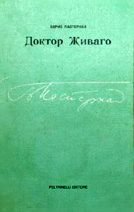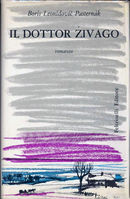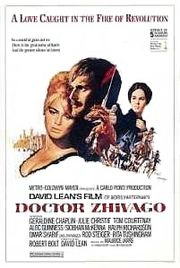Doctor Zhivago
| Doctor Zhivago | |
|---|---|
 First edition cover |
|
| Author | Boris Pasternak |
| Original title | Доктор Живаго (in Russian)' |
| Country | Italy |
| Language | Russian |
| Genre(s) | Historical, Romantic novel |
| Publisher | Feltrinelli (first edition), Pantheon Books |
| Publication date | 1957 |
| Media type | Print (Hardback & Paperback) |
| Pages | 592 (Pantheon) |
| ISBN | NA (Feltrinelli) & ISBN 0-679-77438-6 (Pantheon) |
Doctor Zhivago (Russian: До́ктор Жива́го, Doktor Zhivago Russian pronunciation: [ˈdoktər ʐɪˈvaɡə]) is a 20th century novel by Boris Pasternak, first published in 1957. The novel is named after its protagonist, Yuri Zhivago, a medical doctor and poet. It tells the story of a man torn between two women, set primarily against the backdrop of the Russian Revolution of 1917 and the subsequent Russian Civil War of 1918–1921 (or to some historians 1917-1923). More broadly, the novel discusses the plight of a man as the life that he has always known is dramatically torn apart by forces beyond his control. The book was made into a film by David Lean in 1965 and has also been adapted numerous times for television, most recently as a mini-series for Russian TV in 2006.[1]
Contents |
Background

Although it contains passages written in the 1910s and 1920s, Doctor Zhivago was not completed until 1956. The novel was submitted to the journal <<Новый Мир>> (Novy mir, Russian for both New World and New Peace) and rejected because of Pasternak's political viewpoint was opposed by the Soviet authorities. The author, like Dr Zhivago, showed more concern with the welfare of individuals than with the welfare of society. Soviet censors construed some passages as anti-Marxist. There are implied criticisms of Stalinism and references to prison camps. In 1957, the Italian publisher Giangiacomo Feltrinelli smuggled the book manuscript from the Soviet Union and simultaneously published editions in both Russian and Italian in Milan, Italy. The next year, it was published in English, (translated from Russian by Manya Harari and Max Hayward) and was eventually published in a total of eighteen different languages. The publication of this novel led partly to Pasternak's being awarded the Nobel Prize for Literature in 1958. The Soviet government asked the committee not to award him the prize. Pasternak rejected the Nobel Prize in order to prevent a scandal in the Soviet Union. Boris Pasternak died on 30 May 1960, of natural causes.
Doctor Zhivago was finally published in the Soviet Union in 1988, in the pages of Novy mir, although earlier samizdat editions existed.
Plot summary
Yuri Zhivago is sensitive and poetic nearly to the point of mysticism. In medical school, one of his professors reminds him that bacteria may be beautiful under the microscope, but they do ugly things to people.
Zhivago's idealism and principles stand in contrast to the brutality and horror of World War I, the Russian Revolution, and the subsequent Russian Civil War. A major theme of the novel is how mysticism and idealism are destroyed by both the Bolsheviks and the White Army alike, as both sides commit horrible atrocities. Yuri witnesses dismemberment and other horrors suffered by the innocent civilian population during the turmoil. Even the love of his life, Lara, is taken from him.
He ponders on how war can turn the whole world senseless, and make an otherwise reasonable group of people destroy each other with no regard for life. His journey through Russia has an epic, dreamlike, almost surreal feeling because of his traveling through a world which is in such striking contrast to himself, relatively uncorrupted by the violence, and to his desire to find a place away from it all, which drives him across the Arctic Siberia of Russia, and eventually back to Moscow. Pasternak gives subtle criticism of Soviet ideology: he disagrees with the idea of "building a new man," which, he suggests, is against nature.
Lara's life is also dealt with in considerable detail. Lara, whose full name is Larissa Feodorovna Guishar (later Antipova), is the daughter of a bourgeois mother. She becomes involved in an affair with Viktor Komarovsky, a powerful lawyer with political connections, who both repulses and attracts her. Lara is engaged to Pavel "Pasha" Antipov, an idealistic young student who becomes involved in Bolshevism through his father. To gain independence from Komarovsky, Lara spends three years working as a live-in nanny for a wealthy family (the Kologrivovs). Upon returning her brother begs her to get 700 rubles from Komarovsky to repay money that he has gambled away. Lara gets the money for her brother from her generous employer, Kologrivov. However, when her pupil Lipa graduates, she feels like she is on charity instead of working for her keep in the Kologrivov household. She decides that Komarovsky "owes her" and she will get money from him with which she will become independent. She goes to a party to demand the money from Komarovsky. He is playing cards all evening and she does not get his attention. She finally walks in and attempts to shoot him but misses.[2]
Zhivago briefly encounters Lara while assisting his mentor who has been called by Komarovsky to the scene of the attempted suicide of Lara's mother in response to Lara's and Komarovsky's scandalous relationship. Zhivago also sees Lara at the Christmas party where she tries to shoot Komarovsky. Lara and Zhivago truly meet following a roadside encounter between First World War troop columns, one group being miserable retreating Russian Army deserting veterans and the other group are new recruits bound for the hopeless conditions at the Front. Lara has been serving as nurse while searching for her assumed-dead husband Antipov. The two fall in love as they serve together in a makeshift field hospital. They do not consummate their relationship until much later, meeting in the town of Yuriatin after the war.
Pasha Antipov and Komarovsky continue to play important roles in the story. Pasha is assumed killed in World War I, but is actually captured by the Germans and escapes. Pasha Antipov joins the Bolsheviks and becomes Strelnikov (the shooter), a fearsome Red Army general who becomes infamous for executing White prisoners (hence his nickname). However, he is never a true Bolshevik and yearns for the fighting to be over so he can return to Lara. (The film version would change his character significantly, making him a hard-line Bolshevik.)
Another major character is Liberius, commander of the "Forest Brotherhood", the Red Partisan band which conscripts Yuri into service. Liberius is depicted as loud-mouthed and vain, a dedicated and heroic revolutionary, who bores Yuri with his continuous lectures on the justice of their cause and the inevitability of their victory. He is also addicted to cocaine.
Komarovsky reappears towards the end of the story. He has gained some influence in the Bolshevik government and been appointed minister of justice of the Far Eastern Republic, a Bolshevik puppet state in Siberia. He offers Zhivago and Lara transit out of Russia. They initially refuse, but by lying about Pasha Antipov's death Komarovsky privately persuades Zhivago that it is in Lara's best interests to leave; Zhivago convinces Lara to go with Komarovsky, telling her (falsely) that he will follow her shortly.
Meanwhile, Antipov/Strelnikov falls from grace, loses his position in the Red Army, and returns to Varykino, near Yuriatin, where he hopes to find Lara. She, however, has just left with Komarovsky. After having a lengthy conversation with Zhivago, Pasha Antipov commits suicide and is found the next morning by Zhivago. (In the movie Komarovsky tells Zhivago that he was captured 5 miles outside of Yuriatin and on the way to his execution he grabbed a pistol from a guard and killed himself.) Zhivago's life and health go downhill from this point; he lives with another woman and has two children with her, plans numerous writing projects but does not finish them, and is increasingly absent-minded, erratic, and unwell. Lara eventually returns to Russia on the day of Zhivago's funeral. She gets Yevgraf, his half brother, to try to find her daughter but then disappears.
During World War II Zhivago's old friends Nika Dudorov and Misha Gordon meet up. One of their discussions revolves around a local laundress named Tanya, a bezprizornaya or parentless child, one of many left by the Civil War, and her resemblance to Zhivago. Much later they meet over the first edition of Zhivago's poems. It's unclear in the book why they haven't been published before or why they have been published now.
Other major characters include Tonya Gromeko, Zhivago's wife, and her parents Alexander and Anna, with whom Zhivago lived after he lost his parents as a child. Yevgraf (Evgraf) Zhivago, Yuri's younger illegitimate half-brother (son of his father and a Mongolian princess), is a mysterious figure who gains power and influence with the Bolsheviks and helps his brother evade arrest throughout the course of the story.
The book is packed full of odd coincidences; characters disappear and reappear seemingly at random, encountering each other in the most unlikely places.
Pasternak's description of the singer Kubarikha in the chapter "Iced Rowanberries" is almost identical to the description of the gypsy singer Nadezhda Plevitskaya (1884–1940) by Sofia Satina (sister-in-law and cousin of Sergei Rachmaninoff). Since Rachmaninoff was a friend of the Pasternak family, and Plevitskaya a friend of Rachmaninoff, Plevitskaya was probably Pasternak's "mind image" when he wrote the chapter; something which also shows how Pasternak had roots in music.
Names and places
.jpg)
- Zhivago (Живаго): the Russian root zhiv is similar to 'life'
- Larissa: a Greek name suggesting 'bright, cheerful'
- Komarovsky (Комаровский): komar (комар) is the Russian for 'mosquito'
- Pasha (Паша): the diminutive form of 'Pavel' (Павел), Russian rendering of the name Paul.
- Strelnikov (Стрельников): strelok means 'the shooter'
- Yuriatin (Юрятин): the fictional town was based on the real Perm, near by which Pasternak had lived for several months in 1916.
- The original of the public reading room at Yuriatin was the Pushkin Library, Perm
Film, TV, or theatrical adaptations

Doctor Zhivago has been adapted for film and stage several times:
- A 1959 Brazilian television film (currently unavailable) was the first film version.[3]
- The most famous adaptation is the 1965 film adaptation by David Lean, featuring the Egyptian actor Omar Sharif as Zhivago and English actress Julie Christie as Lara, with Geraldine Chaplin as Tonya and Alec Guinness as Yevgraf. The film was commercially successful and won five Oscars, but was a critical failure; currently, it is widely considered to be a classic popular film. Maurice Jarre's score, featuring the romantic "Lara's Theme," is a big part of the film's appeal. Though faithful to the novel's plot, depictions of several characters and events are noticeably different.
- A 2002 British television serial with Hans Matheson, Keira Knightley, and Sam Neill was broadcast by ITV in the UK in November 2002 and on Masterpiece Theatre in the US in November 2003.
- A 2006 Russian mini-series produced by Mosfilm. With a total running time of over 500 minutes (8 hours and 26 minutes), it is so far the most faithful film adaption of the novel.
- A made-for-cable film remake was announced in 2002, and was to include Joseph Fiennes as Zhivago and Jeremy Irons as Komarovsky, but was canceled. It is unclear whether or not it was the Masterpiece Theatre production or a different version altogether. [1]
- Zhivago, a musical adaptation of Pasternak's novel rather than Lean's film, debuted at the La Jolla Playhouse in 2005 as a Page-To-Stage workshop, and then in a main-stage production which opened in May 2006. A Broadway debut was planned for 2007. It features music by Lucy Simon ("The Secret Garden"), a book by Michael Weller ("Hair," "Ragtime" screenplays), and lyrics by Michael Korie ("Doll" and the "Harvey Milk" opera libretto), and Amy Powers ("Lizzie Borden" and songs for "Sunset Boulevard").
- A musical called "Doktor Zhivago" was scheduled to premier in the Urals city of Perm on 22 March 2007, and to remain in the repertoire of Perm Drama Theatre throughout the 50th Anniversary year [2] [3]. Perm features in the novel under the name "Yuriatin" (which is a fictional city invented by Pasternak for the book) and many locations for events in the book can be accurately traced in Perm', since Pasternak left the street-names mostly unchanged. For example, the Public Reading-Room in which Yuri and Larissa have their chance meeting in "Yuriatin" is exactly where the book places it in contemporary Perm.
See also
- Theme to the film – "Somewhere My Love (Lara's Theme)"
- Doctor Zhivago (film)
References
- ↑ IMDb Russian miniseries release date
- ↑ pp. 73–85
- ↑ Doctor Zhivago at the Internet Movie Database
External links
- Homegrown Doctor Zhivago to Debut on Russian Television
- How the CIA won Zhivago a Nobel
- "The 'Doctor Zhivago' caper" (editorial), The Boston Globe, 20 February 2007.
- "The Wisest Book I Ever Read", by Robert Morgan from The Raleigh News & Observer.
- 'Pasternak - The Real Dr Zhivago A documentary in production'
- 'The Dr Zhivago Drawings' artist's rendering